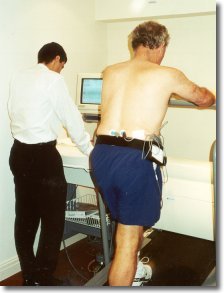|
A stress echo (treadmill) is a combination of an echo and a treadmill exercise stress test. This  type of echo looks at how your heart muscle moves and how your heart valves work at rest and then immediately following exercise. type of echo looks at how your heart muscle moves and how your heart valves work at rest and then immediately following exercise.
The stress echo test takes approximately 45 minutes to complete and is conducted in three parts:
-
A baseline echo is performed to assess cardiac function and to exclude significant valvular pathology.
-
A treadmill exercise stress test is then performed with the Doctor present. ECG electrodes are attached across your chest to monitor the ECG activity of your heart throughout the test. A blood pressure cuff is applied to your arm to automatically monitor your blood pressure. At the start, the treadmill speed is set slow with the treadmill flat to allow you to get comfortable walking on it. Every three minutes, the speed of the treadmill is increased and the angle of the treadmill is raised a few degrees. A progressively greater incline is used to increase the stress on your heart without you having to walk as fast. Your heart rate, heart rhythm and blood pressure are checked during each three-minute stage while you walk. If an ECG or blood pressure problem is noted, the test may be stopped. The test is symptom limited which means we will continue to make the stress harder and harder until you have to stop which generally is because of shortness of breath or fatigue. Less often, it is because of chest discomfort, leg or hip aches. Don't worry, we will not push you too far. We are watching everything very closely and are very experienced. A stress test is the best way to see what the heart can do - when you are closely monitored under the supervision of a very experienced cardiologist. When you cannot go any longer, the treadmill is stopped and you move quickly over to the couch and lay back on your left side.
-
A post-exercise echo is performed. You will be monitored for 6 to 8 minutes after the test for heart rhythm.
The doctor compares the pre and post exercise heart function using a split video screen. A normal response is for the heart to beat harder with stress compared with rest. A report is sent to your doctor by the following day.
|